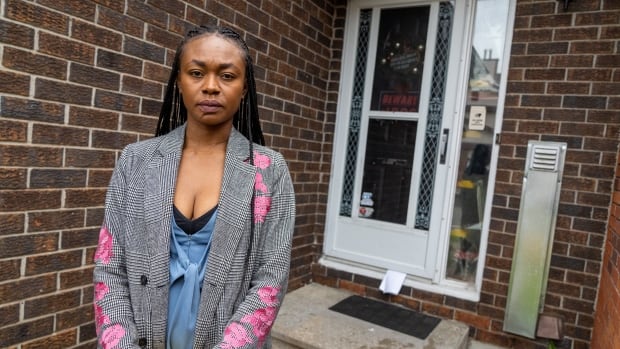
An Ottawa homeowner says she and her daughter could soon be homeless because they can’t move into the townhouse she bought in April due to a tenant who refuses to leave — and she blames the Ontario government for failing her family.
Elsie Kalu says the ordeal led to her losing her job, plus she is now at risk of getting kicked out of her rental and faces threats of foreclosure — losing her property to the mortgage lender. She is begging Ontario’s Landlord and Tenant Board (LTB) to grant her a hearing so she can state her case to evict her tenant and finally move into the home she bought.
“Why would the government allow another person to take everything from one person? It’s like robbing the poor to pay the poor,” said Kalu, standing outside of the home she hasn’t entered since buying it.
“It can’t be right. I cannot provide social services for another citizen. I’m not rich enough.”
It’s like robbing the poor to pay the poor.– Elsie Kalu, Homeowner
Kalu became a small landlord when she purchased a townhome in the city’s eastern suburb of Orléans.
Small landlords — those who typically own just one or two rental units — can become homeless when a tenant refuses to pay rent and leave a space the landlord needs for their own accommodations.
CBC previously spoke to landlords who were homeless due to major delays in getting a hearing and eviction order from the LTB — the body that makes decisions for disputes between landlords and tenants.
Kalu moved across the river from Gatineau, Que., to Ottawa in 2021 to access better health-care services for her daughter, who has autism.
She bought the townhome site unseen during the pandemic real estate boom through a real estate wholesaler, which buys and sells off-market homes at below-market value, and avoids realtor fees — a risky move, she acknowledged in hindsight.
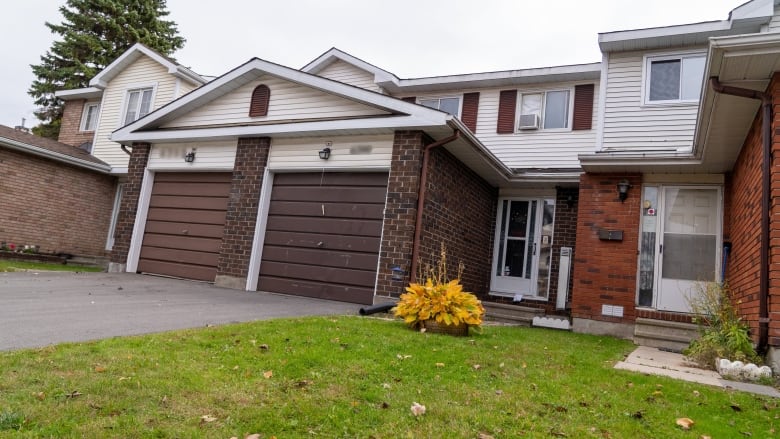
It was only after signing the purchase agreement in January, Kalu said, when she found out she had an unco-operative tenant and a male occupant.
Kalu closed on the home in April but says she’s received no rent so far, and has started a file with the LTB about this.
CBC has tried to contact the two occupants.
When a reporter knocked on their door, which was barricaded from inside with plastic boxes, they did not answer and shut their curtain as music blared from inside the home.
A lawyer representing them said Kalu should go through the LTB “if she believes that she is actually owed rent.”
No job, no money for daughter’s therapy
The LTB has a service standard to schedule hearings within 25 business days. An update this July says it should take seven to eight months.
Kalu filed an eviction application to the LTB in May.
Since then, she’s trying to fork out more than $5,000 a month for the home she’s currently renting, and utilities, plus the mortgage, condo fees, and property taxes for her Orléans home.
According to her LTB submission, Kalu lost her job this August as a financial adviser, which required her to pass a regular credit score check. She’s been taking out loans and racking up her credit card debt, so her score didn’t meet her company threshold.
“I’m just sinking … Financially, it has wrecked me,” said Kalu. “This has ruined me emotionally and mentally.”
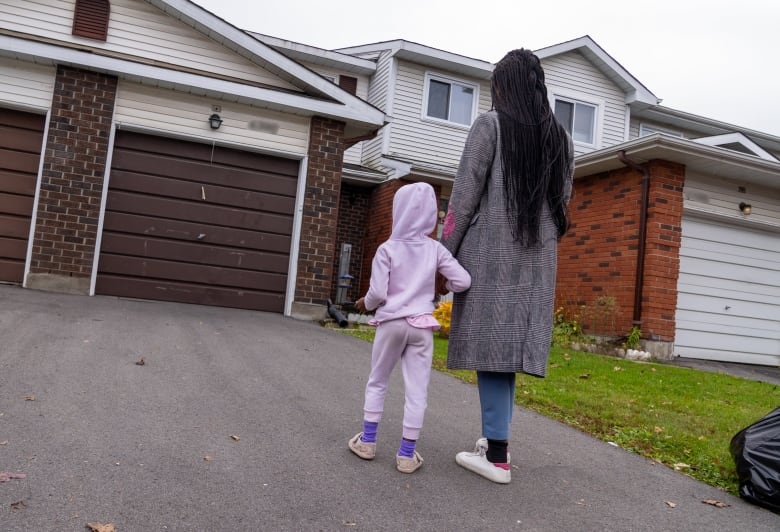
The submission goes on to say Kalu’s four-year-old daughter was diagnosed with autism last year, but still can’t attend the school near the new home, which promised to provide her a speech therapist and other resources.
For the past three months, Kalu said she stopped critical therapy for her daughter because she can’t afford it.
Denied expedited hearing, foreclosure threat
Then earlier this month, Kalu’s lender sent her an email indicating it would consider legal action should she miss another mortgage payment this December.
“So if the LTB doesn’t help me … everything I’ve worked for, all that I’ve invested, I could just lose it,” she said.
Kalu’s current landlord also issued her a notice to end her tenancy for missing one month’s rent.
Kalu says she’s called three local shelters — one that had a wait list of two years, and the others said they can’t accept her until she’s actually homeless.
“So basically, ‘we cannot help you until the day you’ll be really ending up in the gutter,'” said Kalu.
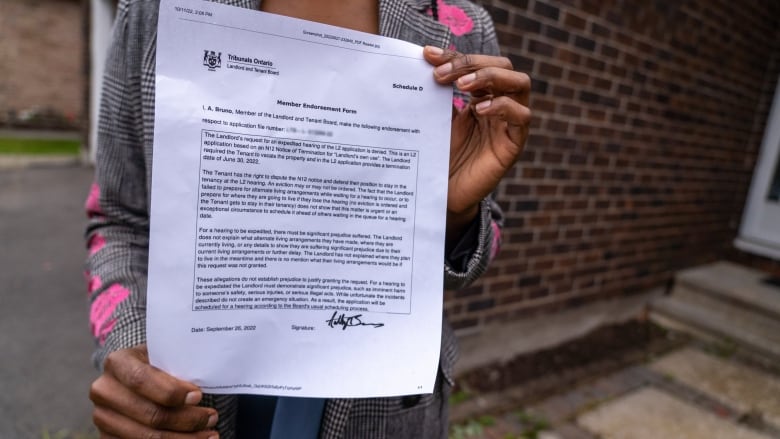
Kalu’s paralegal filed a request to expedite her hearing. The LTB refused in September saying the case isn’t urgent enough, according to its threshold.
“I’m frustrated, I’m outraged, I’m angry and I’m sad,” said Kalu. “They can’t stay forever because I can’t [continue to] pay [the] mortgage and be homeless, and that’s what’s about to happen now.”
“My daughter can’t end up on the streets. I cannot end up on the streets … I need my home.”
Tenant silent, lawyer responds
Kalu gave her tenant an N12 notice this April — a form under Ontario’s Residential and Tenancies Act to notify tenants about a landlord’s intention to move in. She’s also served the tenant multiple N4 notices for non-payment.
Lawyer Michael Thiele, who represents the tenant and the male occupant, said in an email that his clients have “the right to occupy the premises for an indefinite period of time.”
“Everyone knows how inflation has caused rents to skyrocket. Affordability is a huge problem. Moving onto the street is not an option,” Thiele wrote.
When asked why the tenant hasn’t paid rent, Thiele suggested Kalu take it up with the LTB “if she believes that she is actually owed rent,” but didn’t elaborate or provide proof of payment when CBC followed up.
Kalu has a separate application open with the LTB for the tenant’s non-payment of rent.
WATCH | Kalu tries to enter her home for the 5th time with CBC Ottawa:
Elsie Kalu, who bought a house in Orléans in April 2022, says the tenants won’t allow her to enter the home and refuse to pay rent. She has filed an eviction application, but backlogs at the Landlord and Tenant Board mean she doesn’t yet have a hearing date.
According to Kalu’s submission, the occupants refused to let her inspect the home four times despite 24-hour notices — by posting doctor’s letters on their door citing COVID concerns stating they’re unvaccinated.
Thiele responded to this stating the household is “entitled to protect themselves.”
A landlord can enter a rental unit after giving 24-hour notice to carry out an inspection to see if it’s in good repair, to carry out repairs, or for “any other reasonable reason” set out in the lease, according to the Residential Tenancies Act.
The occupants also refused to let an appraiser in to appraise the home, the LTB submission states, so Kalu couldn’t get financing with her bank — forcing her to delay the closing and use a private lender with an 8.99 per cent interest rate and two per cent lender fee.
“The rights of entry are stipulated in the Residential Tenancies Act. This is not one of them,” Thiele wrote. “Why should a tenant allow a landlord to enter a property to snoop around? This is the tenant’s home and arguing that the tenant should open her door to the whims of the landlord disregards the fact that a person has the right to privacy in their home. The tenant doesn’t need a reason to refuse. The landlord needs a legal reason to enter — the difference is significant.”
The Act states a landlord can enter to allow a potential mortgagee or insurer to view the unit.
Kalu’s LTB submission also states an occupant told her “the house is dilapidated,” but refused to allow tradespeople she hired to enter.
Thiele said his client disagrees with this characterization, and said the tenant may file against Kalu at the LTB for the condition of the house, citing rent abatement.
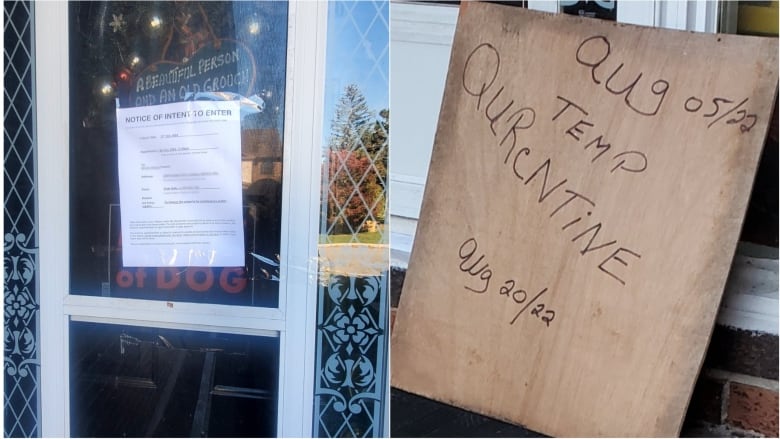
Kalu said in her submission that the first time she met the tenant and the male occupant, they closed the garage door on her and her daughter’s head.
In response, Thiele said tenants may have the right “to repel trespassers who refuse to leave” and said landlords can call police should they feel they have been wronged.
CBC asked the LTB for submissions or responses filed by the tenant in relation to Kalu’s eviction and non-payment applications, but the LTB said it found none.
WATCH | Small landlords advocate talks possible solutions for LTB backlog:
Varun Sriskanda, a member of the board of directors for Small Ownership Landlords of Ontario, says fixing the backlog at the Landlord and Tenant Board should be a priority for the province.
CBC spoke with the previous landlord who said he’s rented the home to the tenant for about a decade.
He said he began having issues with the two occupants just before the pandemic, when he notified them he wanted to sell the home after getting diagnosed with cancer.
The former landlord said the LTB had failed him, too, as he never made it through an eviction hearing after applying for one.
Who’s responsible for failing landlords?
“My anger to [the tenant] is limited, but my anger to the government, my anger to LTB, that is the part that really drives me crazy,” said Kalu.
“They should not let this happen.”
In an email to CBC, Ontario’s Landlord Tenant Board blames the Ontario government’s temporary moratorium pausing eviction hearings from March to August 2020 for its longer-than-average wait times and backlog. It’s working to modernize operations and hire more staff to help go through the backlog, a spokesperson wrote.
It says, as of Sept. 30, there were 36 full-time and 47 part-time adjudicators at the LTB.
The LTB would not answer whether the board was responsible for failing small landlords, redirecting the question to the Ontario Attorney General’s office. That office declined to comment.
When asked who could compensate small landlords who have become homeless, forfeited their homes, and lost thousands of dollars in arrears due to LTB delays, the tribunal referred CBC to Ontario’s Housing Ministry.
When asked whether there are discussions to create separate considerations for small landlords in the Residential Tenancies Act, which advocates say is allowing some to fall through the cracks, the LTB again referred CBC to the Housing Ministry.
The Housing ministry also didn’t answer those questions directly, but said it’s committed to the well-being of Ontarians, continuing its work on homeless prevention, and “making sure tenants and landlords are treated fairly.”

“This is a cruel and unusual punishment [for Kalu],” said Varun Sriskanda, a board member with Small Ownership Landlords of Ontario, a not-for-profit group for small landlords.
The LTB must fix its backlog as soon as possible, Sriskanda said.
It needs to hire more adjudicators and stop doing hearings virtually, as it’s allowed for delays and distractions by those who aren’t tech-savvy, he said. The $19 million the Ontario government pledged this year to tribunals won’t go far enough, he said.
“It’s an absolute mess,” said Sriskanda. “It’s failing tenants and landlords entirely.”

